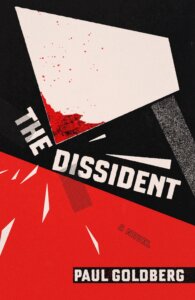Any resemblance between these characters and Vladimir Putin’s Russia is strictly intentional
In Paul Goldberg’s ‘The Dissident,’ a Jewish refusenik must try to solve a murder before Henry Kissinger comes to town

Paul Goldberg’s novel is set in 1970s Russia. Photo by Istock
The Dissident: A Novel
By Paul Goldberg
Farrar, Straus and Giroux, 432 pages, $28
Viktor Venyaminovich Moroz, a Jewish refusenik in the Soviet Union of the mid-1970s and the principal protagonist of Paul Goldberg’s The Dissident, inhabits a world on the cusp of change — or collapse.
The first signal of that shuddering transition is Goldberg’s epigraph, the famous concluding stage directions of Chekhov’s The Cherry Orchard, rendered here in both English and Russian. With “the sound of an ax slamming into wood,” Chekhov informs us that the eponymous orchard, the subject of so much dramatic contention, faces destruction.
In The Dissident, a fast-paced, convoluted, polyglot picaresque bursting with literary and artistic allusions, an ax also turns up — this time, as a murder weapon. On his wedding day, Viktor, an engineer by training, stumbles onto two butchered corpses in a lover’s clinch. After he flees, he is kidnapped and tasked by the KGB, however improbably, with solving the crime, and quickly. “You are a logical thinker, resourceful, strategic, not without connections,” the KGB agent Lydia Ivanovna tells him.
The timeline, of just a few days, is related to the impending visit of U.S. Secretary of State Henry Kissinger. An unsolved double murder, with one victim a likely CIA agent and the other a leading refusenik, would constitute a diplomatic embarrassment.
The novel’s milieu is one that Goldberg, the Russian-born author of two nonfiction books on the Soviet human rights movement (as well as the novels The Château and The Yid), knows well. He depicts 1970s Moscow and its currents of protest, repression and dissent with both rueful affection and a sense of the deadly absurdity of Soviet life.

In The Dissident, surveillance is rampant. The narrative is studded with renderings of overheard conversations. Dissidents are caught on film and captured in art. The authorities are both elusive and omnipresent. Characters, American and Soviet alike, have murky agendas, and no one is entirely trustworthy. Intergenerational rifts, betrayals, and deals with the (political) devil are the norm. Any historical parallels to Putin’s present-day Russia, where the tentacles of totalitarianism increasingly invade everyday life, seem strictly intentional.
Goldberg and his characters are steeped in Russian literature. Along with Chekhov, Goldberg relies on Mikhail Bulgakov’s Stalinist-era The Master and Margarita and Dostoevsky’s Crime and Punishment for metaphorical assists. He borrows character names from Pushkin’s verse novel Evgeny Onegin.
Bulgakov’s fantastical tale, in part the story of a Faustian bargain, becomes relevant to Viktor’s plight when the KGB demands his cooperation, or collaboration. Is it better, he asks himself, to risk being charged with murders he didn’t commit, or to barter for freedom with the forces of evil? “Is it possible to rent out the soul instead of selling it outright?” Viktor wonders.
Unlike Dostoevsky’s Raskolnikov, Viktor is no criminal, but he nevertheless must deal with the complicated fallout of a crime, and the looming possibility of punishment.
Goldberg’s third-person narration employs flashbacks (“We reshuffle the dossiers and turn back the clock,” the narrator explains) and multiple perspectives. Viktor’s wife, Oksana Yakovlevna Moskvina, “a woman of a difficult-to-place otherness,” is every bit his match. An English teacher and a lover of the underground literature known as samizdat, she operates at the vortex of Soviet propaganda and protest.
Other point-of-view characters include Norman Dymshitz, a Holocaust survivor and former partisan fighter, and his son, Madison “Mad Dog” Dymshitz. The Harvard-educated Mad Dog is the Moscow correspondent of an unnamed American newspaper, a man whose motives can be hard to discern.
As depicted by Goldberg, the refusenik and broader Soviet dissident communities coexist in an uneasy alliance. The refuseniks, whose name references their denied visas, want mainly to leave the country, while other dissidents seek a democratic transformation of Soviet society.

The novel’s title seems to refer to Viktor. But it is also the title of a sculpture by Elrad “Erik” Rudol’fovich Barkin, a Moscow artist who works at the edge of official tolerance. Mad Dog is keen to collect Barkin’s satirical art for U.S. museums but unwilling to offer a suitable price.
Wherever the action leads, by way of Goldberg’s pirouetting prose, the KGB agent Lydia Ivanovna keeps turning up. She describes herself as Viktor’s “curator,” a term evocative of the artworld. She has a tragic backstory of her own, involving a girlhood rape at the hands of Beria, the onetime director of Stalin’s secret police. Her KGB, she insists, is a kinder, gentler version of that organization, “where laws get observed, to a great extent.” The qualifier is telling.
The acidic absurdism of The Dissident seems familiar enough from other dystopic fiction about totalitarian regimes. Goldberg’s stance doesn’t really break new ground. But he handles his labyrinthine plot and long cast of characters with aplomb, while managing to keep the novel’s narrative voice jaunty and the pace taut.
In The Cherry Orchard, which reappears intermittently in Goldberg’s tale, his native country teeters perilously between comedy and tragedy. The Dissident is at once a time capsule, a critical commentary on Russian literature, and an indictment of Soviet society and its successor regimes. The Holocaust, too, casts a lengthy shadow. It teaches an obvious lesson: that Jews above all (but surely not just Jews) must “value human life and respect others,” a simple prescription that mostly eludes Goldberg’s semi-fictional, grotesquely realistic Soviet Union.
















